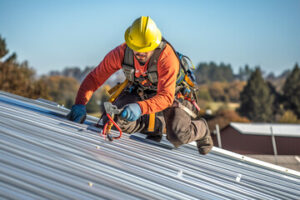What You Should Know About a Roofing Company
SYBO Roofing and Construction of Punta Gorda LLC provides roof installation, repair, and maintenance services. These professionals offer solutions for both residential and commercial structures. It is important to know your costs before starting a roofing business. A business plan will help you determine your operating expenses and profitability.
Many small businesses avoid legal processes and bookkeeping, but these tasks are easier than they look. The roofing community has helpful accounting experts and lawyers who can assist you.

Roof replacement is a complex job, and there are many costs associated with the work. Some of the main costs include labor, roofing materials, disposal of waste materials, and other expenses. The type of roofing material you choose also affects the cost. For example, a metal roof is typically more expensive than an asphalt shingle roof. Also, different roofing materials have varying lifespans and require more or less maintenance.
A new roofing company must budget for all these expenses before starting the business. The best way to calculate startup costs is to talk with a CPA and involve them in the planning process from day one. This will help ensure the numbers are accurate and you have a solid plan for generating income to cover your expenses.
You should also consider if you want to do insurance claims or other specialized services, as these may have higher fees. Additionally, it would be best to consider whether or not to use a legal entity for the business. It will likely require a fictitious name registration with your local government if you do.
Another important cost to factor in is the amount of money you’ll need for equipment. Purchasing quality tools from the start is essential to ensuring you have everything you need to get started. It would be best to look for deals on used tools when possible and closely monitor your equipment budget. Buying too much equipment upfront can be a big mistake, especially for a new roofing company.
The choice of shingles will have the biggest impact on your re-roofing costs. A reputable roofing contractor will only recommend the highest quality shingles, which can withstand the weather conditions in the City. In addition, high-quality shingles will last longer than cheaper ones.
If you need help deciding which shingles to purchase, ask your roofing contractor for a few samples. Then, you can make a decision based on your budget and preferences.
Generally, your re-roofing costs are roughly $4,000 to $6,000. However, many factors can change these prices, including the damage amount, the roof’s complexity, and other expenses.
Whether you’re working on a roof for a new construction project or repairing an existing one, the materials you use will significantly impact the final results. Quality roofing materials will withstand City’s weather and last decades. Look for a contractor who uses top-of-the-line products, like those by Firestone and GAF.
You’ll also need various tools and supplies, including hammers, nail guns, utility knives, and tarps. You’ll also need a ladder and safety equipment, such as protective eyewear. If you have a ladder that’s longer than 20 feet, you should purchase a fall protection harness to protect yourself.
Other essential items include a chalk reel used to snap chalk lines along rooftops. This will help you create straight marks, such as those needed to install open valleys and align gutters. Investing in a quality chalk reel that comes with bulk replacement chalk is a good idea, as you’ll be using it frequently.
Another tool is a tape measure used to make accurate measurements. You’ll need to know how much roof area your client has and the dimensions of the roof. Having a metal roofing nailer is also helpful, which is an efficient way to lay down shingles.
A roofing company should have a well-signed vehicle with its name, phone number, and website. Consider registering your business name with your local government, especially if it’s different from the legal name of your business.
Roofing companies have many insurance policies and coverages to protect themselves from accidents and damages. A professional insurance provider can help them identify what coverage they need based on the size of their business, employees, and value of assets such as equipment and tools. They can also review the risks impacting their premium costs, such as weather and vandalism. They can also recommend the best ways to limit liability and reduce insurance costs.
Most roofing companies will need commercial general liability insurance, which covers third-party injuries and property damage caused by their work. In addition, they should consider workers’ compensation insurance, which pays disability and death benefits to employees in the event of a workplace injury. Roofing companies should also have builders risk insurance, which protects buildings under construction from theft, fire, and other damages.
Insurance is essential for any small business and even more important for a contractor who works on people’s homes. There are a lot of potential liability issues that could come up, from broken windows to damaged roofs. The right insurance can give you peace of mind and protect your business from costly lawsuits.
Roofing worksites tend to be messy, and it can be easy for a homeowner, family member, or someone walking by your site to trip over something and become injured. The roofing contractor’s general liability insurance will pay for the medical bills and legal fees resulting from this accident.
Another type of insurance that many roofing contractors need is inland marine insurance, which covers repairing or replacing equipment and lost or stolen supplies while in transit. Roofing contractors who use heavy machinery, such as a crane or scissor lift, will also need this type of insurance to cover their equipment when it’s off their property.
Lastly, roofing contractors should consider a business owner policy (BOP), which bundles property and liability coverage in one package. BOPs are typically recommended for smaller businesses and can save money on insurance rates compared to buying the coverages separately.
A quality roofing company will offer a warranty to their clients. This warranty promises that the roofing contractor will fix any issues with your roof that arise within a certain amount of time. It would be best to look for a warranty covering artistry and materials. Some warranties include coverage for other problems, such as leaks or high winds.
The type of roofing warranty you choose will depend on your needs and the material used. The two main types of roofing warranties are manufacturer and artistry warranties. A manufacturer warranty typically covers the materials and lasts several years to several decades. An artistry warranty covers the installation process and any errors made by the roofing contractors. It typically lasts for one to ten years.
Some manufacturers, such as Owens Corning and GAF, also offer enhanced product warranties, including a no-dollar limit (NDL) or extended labor warranty. These warranties provide more comprehensive protection than standard warranties and should be considered when choosing a roofing contractor. These warranties are only available through roofing contractors certified by the manufacturer to install their products.
You should also check to ensure the warranty is registered with the manufacturer. Most warranties require the contractor to register the warranty within a specific timeframe to avoid losing coverage. This is especially important if you are considering a roofing contractor that uses a unique product or brand.
If you find a roofing contractor that does not offer a warranty as part of their service, it is best to go with another company. A reputable roofing contractor will happily provide a written warranty as part of their service agreement.
It is also good to check the roofing contractor’s website for any information on their work and customer satisfaction. Many websites will display client testimonials and reviews, giving you an idea of the level of service to expect from a particular roofing company. In addition, you should look for a website that offers a mobile-friendly version of its site and includes contact information, including a physical address, email addresses, and phone numbers.
